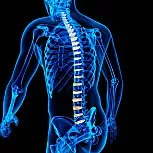Is Degenerative Disc Disease (DDD) Considered a Disability?
 Degenerative disc disease (DDD) refers to a common condition characterized by the gradual deterioration of the spinal discs. As individuals age, the discs lose moisture and elasticity, leading to shrinkage, bulging, or herniation. This degeneration can result in chronic back pain, stiffness, and limited mobility, significantly impacting an individual’s quality of life. Given these profound effects, many people wonder whether degenerative disc disease qualifies as a disability.
Degenerative disc disease (DDD) refers to a common condition characterized by the gradual deterioration of the spinal discs. As individuals age, the discs lose moisture and elasticity, leading to shrinkage, bulging, or herniation. This degeneration can result in chronic back pain, stiffness, and limited mobility, significantly impacting an individual’s quality of life. Given these profound effects, many people wonder whether degenerative disc disease qualifies as a disability.
Understanding Disability and DDD:
To address this question, it’s essential to understand the concept of disability. Disability, per the Americans with Disabilities Act, is a physical or mental impairment that substantially limits one or more major life activities. Major life activities include walking, standing, lifting, bending, and performing manual tasks. Therefore, the key consideration in determining whether degenerative disc disease constitutes a disability lies in its impact on an individual’s ability to engage in these essential activities.
Challenges Faced by Individuals with DDD:
Individuals with degenerative disc disease often experience chronic pain and physical limitations that can interfere with their ability to work. Also, to care for themselves and participate in recreational activities. The severity of symptoms can vary widely among individuals, ranging from mild discomfort to debilitating pain and functional impairment. Factors such as the location and extent of disc degeneration, the presence of nerve compression, and overall spinal health can influence the degree of disability experienced by affected individuals.
Legal Considerations and Disability Determination:
In the United States, the Social Security Administration (SSA) determines eligibility for disability benefits. To qualify for Social Security Disability Insurance (SSDI) or Supplemental Security Income (SSI) benefits due to degenerative disc disease, individuals must demonstrate that their condition meets the criteria outlined in the SSA’s Blue Book listing for spinal disorders. This listing requires objective medical evidence of nerve root compression, spinal arachnoiditis, or lumbar spinal stenosis resulting in chronic pain and limited functional capacity. Another source of degenerative disc disease treatment is explained on our webpage for treatment.
Conclusion:
In conclusion, whether degenerative disc disease meets the classification as a disability depends on the severity of symptoms. Furthermore, those symptoms must impact an individual’s ability to perform major life activities. While many people with DDD experience chronic pain and functional limitations, not all meet the ADA or SSA guidelines criteria.
Finally, determining disability eligibility involves an evaluation of the individual’s medical condition, functional limitations, and ability to engage in employment. Therefore, degenerative disc disease can significantly impair the quality of life and the work capacity of some individuals; Its classification as a disability ultimately depends on the specific circumstances of each case.
The Southwest Scoliosis and Spine Institute
If you are suffering from Back Pain, we invite you to call our office and make an appointment at one of our three locations in Dallas, Plano, and Frisco, Texas. Richard Hostin, MD, Devesh Ramnath, MD, Ishaq Syed, MD, Shyam Kishan, MD, and Kathryn Wiesman, MD, have many years of training and experience in Spine and Back Pain for kids, adolescents, and adults, and can help their patients get back to living the life they enjoy.
____________________
The medical content on this page has been carefully reviewed. It was approved for accuracy by the Southwest Scoliosis and Spine Institute’s qualified healthcare professionals. This includes our board-certified physicians and Physician Assistants. Our team ensures that all information reflects the latest evidence-based practices and meets rigorous standards of medical accuracy. Basically, the team ensures correctness to guarantee reliability for our patients.
We’re here to help STOP THE PAIN
If your loved one suffers from scoliosis or another complex spine condition, hope exists. We can help. Call Southwest Scoliosis and Spine Institute at 214-556-0555 to make an appointment today.

Recent Comments